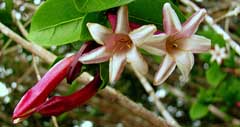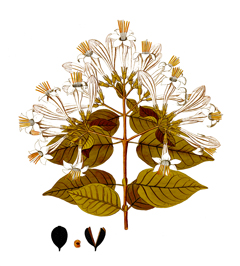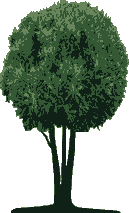 |
|
https://edibleplants.org/ |
 |
| https://edibleplants.org/ |
Translate this page:
Summary
Coutera hexandra is a semideciduous plant that grows up to 6 m tall with a short, usually crooked bole. It is often planted as an ornamental plant. It is commonly found in South America and grows well under sunny condition and moist soil. The bark is used in the treatment of malaria and fever. The wood is moderately heavy and hard but not very durable. It is used for tool handles, fuel and charcoal.
Argentina, Paraguay, Brazil, Bolivia, Peru, Ecuador, Colombia, Venezuela, the Guyanas; C. America - Panama to Mexico; Caribbean- Trinidad
Physical Characteristics

 Coutarea hexandra is a deciduous Tree growing to 4.5 m (14ft) by 4.5 m (14ft) at a medium rate.
Coutarea hexandra is a deciduous Tree growing to 4.5 m (14ft) by 4.5 m (14ft) at a medium rate.
See above for USDA hardiness. It is hardy to UK zone 10.
Suitable for: light (sandy), medium (loamy) and heavy (clay) soils and prefers well-drained soil. Suitable pH: mildly acid, neutral and basic (mildly alkaline) soils. It cannot grow in the shade. It prefers moist soil.
UK Hardiness Map
US Hardiness Map
Synonyms
Bignonia triflora Pav. ex DC. Cinchona souzana (Mart.) Brign. Coutarea alba Griseb. Coutarea campani
Plant Habitats
Edible Uses
References More on Edible Uses
Medicinal Uses
Plants For A Future can not take any responsibility for any adverse effects from the use of plants. Always seek advice from a professional before using a plant medicinally.
Antiinflammatory Bitter Febrifuge Hypoglycaemic Malaria Stomachic Tonic Vermifuge
The stem bark is bitter, febrifuge, stomachic and tonic[ 348 , 739 ]. It can be used as a substitute for quinine (Cinchona spp.) when treating malaria, and is also used for treating swamp fever[ 348 , 739 ]. The root bark is mixed in a decoction with stem bark and then used as an antidiabetic and vermifuge[ 348 ]. The plant is a rich source of neoflavonoids and their glycosides[ 739 ]. One of the compounds in the plant has been shown to exert a relaxing effect upon the trachea[ 420 ]. The plant extract has been shown to be antiinflammatory[ 739 ].
References More on Medicinal Uses
The Bookshop: Edible Plant Books
Our Latest books on Perennial Plants For Food Forests and Permaculture Gardens in paperback or digital formats.

Edible Tropical Plants
Food Forest Plants for Hotter Conditions: 250+ Plants For Tropical Food Forests & Permaculture Gardens.
More

Edible Temperate Plants
Plants for Your Food Forest: 500 Plants for Temperate Food Forests & Permaculture Gardens.
More

More Books
PFAF have eight books available in paperback and digital formats. Browse the shop for more information.
Shop Now
Other Uses
Charcoal Fuel Wood
Other Uses The wood is of medium and uniform texture, moderately heavy, hard, flexible, with moderate mechanical properties and not very durable. The wood is usually too small to be of much use apart from items such as tool handles[ 420 ]. The wood is used for fuel and to make charcoal[ 420 ].
Special Uses
References More on Other Uses
Cultivation details
Grows best in a sunny position[ 420 ]. Prefers a moist soil[ 420 ]. Semi-deciduous
References Carbon Farming Information and Carbon Sequestration Information
Temperature Converter
Type a value in the Celsius field to convert the value to Fahrenheit:
Fahrenheit:
The PFAF Bookshop
Plants For A Future have a number of books available in paperback and digital form. Book titles include Edible Plants, Edible Perennials, Edible Trees,Edible Shrubs, Woodland Gardening, and Temperate Food Forest Plants. Our new book is Food Forest Plants For Hotter Conditions (Tropical and Sub-Tropical).
Shop Now
Plant Propagation
Seed
Other Names
If available other names are mentioned here
Coutera hexandra or Coutera
Native Range
NORTHERN AMERICA: Mexico (Chiapas) SOUTHERN AMERICA: Costa Rica, Guatemala, Honduras, Nicaragua, Panama, El Salvador, Guyana, Suriname, Venezuela, Brazil, Bolivia, Colombia, Ecuador, Peru, Argentina, Paraguay
Weed Potential
Right plant wrong place. We are currently updating this section.
Please note that a plant may be invasive in one area but may not in your area so it's worth checking.
None Known
Conservation Status
IUCN Red List of Threatened Plants Status : This taxon has not yet been assessed

Growth: S = slow M = medium F = fast. Soil: L = light (sandy) M = medium H = heavy (clay). pH: A = acid N = neutral B = basic (alkaline). Shade: F = full shade S = semi-shade N = no shade. Moisture: D = dry M = Moist We = wet Wa = water.
Now available:
Food Forest Plants for Mediterranean Conditions
350+ Perennial Plants For Mediterranean and Drier Food Forests and Permaculture Gardens.
[Paperback and eBook]
This is the third in Plants For A Future's series of plant guides for food forests tailored to
specific climate zones. Following volumes on temperate and tropical ecosystems, this book focuses
on species suited to Mediterranean conditions—regions with hot, dry summers and cool, wet winters,
often facing the added challenge of climate change.
Read More
Expert comment
Author
(Jacq.) K.Schum.
Botanical References
Links / References
For a list of references used on this page please go here
A special thanks to Ken Fern for some of the information used on this page.
Readers comment
| Add a comment |
|
If you have important information about this plant that may help other users please add a comment or link below. Only comments or links that are felt to be directly relevant to a plant will be included. If you think a comment/link or information contained on this page is inaccurate or misleading we would welcome your feedback at [email protected]. If you have questions about a plant please use the Forum on this website as we do not have the resources to answer questions ourselves.
* Please note: the comments by website users are not necessarily those held by PFAF and may give misleading or inaccurate information.
To leave a comment please Register or login here All comments need to be approved so will not appear immediately.
|
Subject : Coutarea hexandra
|
|
|
|